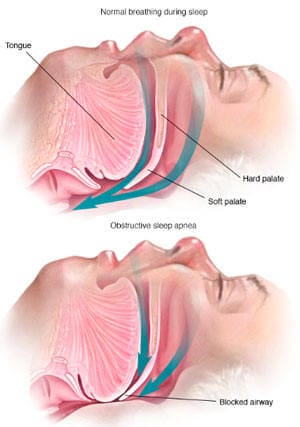Signs of Obstructive Sleep Apnea
Obstructive sleep apnea is a common medical condition that affects many people. It is a potentially serious sleep condition which causes you to repeatedly stop and start breathing while sleeping.
 These pauses can last from seconds to minutes and decrease the amount of oxygen you have in your body. Ultimately, this can have harmful consequences to your body and overall health.
These pauses can last from seconds to minutes and decrease the amount of oxygen you have in your body. Ultimately, this can have harmful consequences to your body and overall health.
Although there are multiple types of sleep apnea, obstructive sleep apnea is the most common. It is caused by a variety of reasons; however, obesity is a major risk factor.
During sleep, the muscles in our throat relax and cause our airways to collapse. This leads to the pauses in breathing.
Obesity also contributes to obstructive sleep apnea by adding extra weight to the neck. This adds pressure to the airway and can worsen the collapse of the airways.
Obstructive sleep apnea is a chronic condition that can cause other serious medical problems. Because of this, it is important to know how to recognize sleep apnea symptoms and when to seek medical advice.
- Snoring
A multitude of factors can cause snoring. However, excessively loud and constant snoring can be a sign of obstructive sleep apnea. When our airways are narrowed in the body, this causes the air to vibrate the soft tissues of the neck as we breathe. This turbulent airflow passing through a narrowed airway and the vibration of the tissues, lead to snoring. In a person with obstructive sleep apnea, our airways are tightened and this leads to the snoring that may be keeping your significant other awake at night. The snoring is also generally worse when sleeping on your back, which causes increased pressure on the neck. If this is the case, there are many snoring aids available and it is important to consult your doctor. - Pauses in snoring and loud gasps
Not only is snoring a common sign of obstructive sleep apnea, but pauses in snoring followed by a loud gasp is also a worrisome symptom. These seconds of silence may be a period where your airway collapses from the obstructive sleep apnea and you are not breathing. This causes your oxygen levels to go down and decreases the oxygen, a vital nutrient, in the body. The decreased level of oxygen and pauses in breathing tells your brain you need air. The demand for air then triggers your body to take a deep breath or gasps and wake you up. - Daytime sleepiness
Exhaustion and feeling overly tired throughout the day can be a sign of many different things. It can be caused by insomnia, stress, depression, caffeine use, medication use and other causes. One possible cause is obstructive sleep apnea. People who suffer from obstructive sleep apnea are unable to get a successful, restful night’s sleep. The pauses in breathing and gasping for air forces the body to wake up and prevent REM sleep, the deepest sleep needed for a restful sleep. - Inability to concentrate and focus
To effectively concentrate and focus, it is important to get proper sleep at night. While asleep, the body is always working to release specific hormones and store memories. Without deep sleep, the mind cannot store memories as effectively and the constant drowsiness can make it difficult to concentrate and focus on specific tasks throughout the day. The change and lack of hormones released at night can also cause changes in mood and overall irritability. - High blood pressure
High blood pressure is also a common problem among adults and elderly patients. It can be caused and worsened by a number of reasons. It is crucial to treat high blood pressure or the underlying cause of high blood pressure to reduce your risk of coronary artery disease, heart attack and stroke.
Obstructive sleep apnea causes pauses in breathing, which ultimately causes a decrease in the oxygen in your blood. Oxygen is a vital nutrient required by every organ in your body. When your body senses a lowered oxygen level, the blood vessels respond by getting smaller. This causes your blood pressure to go up and without treatment of the obstructive sleep apnea, blood pressure will remain high. - Dry mouth and sore throat
Obstructive sleep apnea generally causes people to breathe through their mouths while they sleep. Normally, we breathe through our nose, which specifically helps humidify the air we breathe. Contrary to this, when we breathe through our mouths at night with obstructive sleep apnea, the air remains dry and this dehydrates the mouth and throat. This can lead to a dry mouth and sore throat when you wake up.


